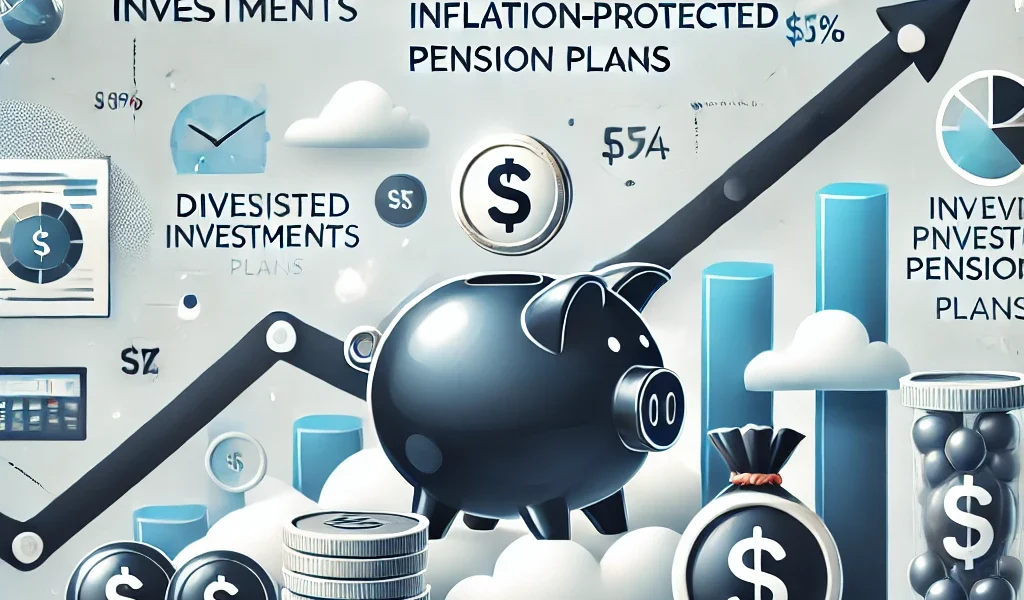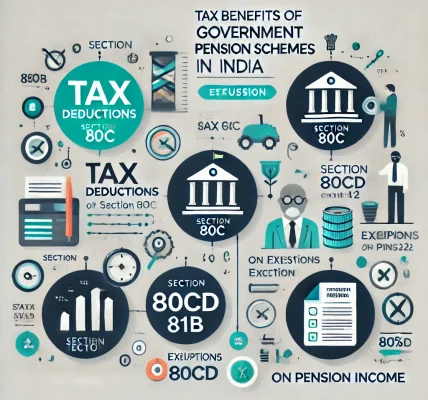Introduction
Retirement planning is a critical financial goal, and one of the biggest threats to a comfortable retirement is inflation. Over time, inflation reduces the purchasing power of money, making it crucial to plan a pension strategy that safeguards your future.
In this article, we will discuss how inflation impacts your pension, why it matters, and the best ways to protect your retirement savings from its effects.
What is Inflation?
Inflation is the rate at which the general level of prices for goods and services rises, leading to a decrease in the purchasing power of money. For example, if inflation is 5% per year, an item that costs $100 today will cost $105 next year.
Why is Inflation a Concern for Pensioners?
- Reduced Purchasing Power – Your pension savings may not be enough to cover expenses in the future.
- Increased Healthcare Costs – Medical expenses tend to rise faster than general inflation.
- Longevity Risk – If you live longer, you need more money, and inflation can erode your savings.
How Inflation Impacts Your Pension
1. Fixed Income Pensions Lose Value
Pension plans that provide a fixed monthly payout do not adjust for inflation, meaning the real value of the money you receive decreases over time.
2. Rising Cost of Living
Essential expenses like food, housing, and healthcare continue to rise, making it difficult for retirees to maintain their standard of living.
3. Lower Interest Rates & Returns
Inflation often leads to lower interest rates, reducing the returns on fixed deposits and pension funds.
4. Social Security May Not Keep Up
Government pension schemes and social security payments may not increase at the same rate as inflation, leaving retirees financially vulnerable.
Ways to Secure Your Future Against Inflation
1. Invest in Inflation-Protected Pension Plans
Look for pension schemes that offer inflation-indexed payouts or market-linked returns to help your money grow over time.
2. Diversify Your Investments
Do not rely solely on a fixed pension; consider investing in a mix of stocks, bonds, real estate, and mutual funds to counteract inflation.
3. Opt for National Pension System (NPS)
The National Pension System (NPS) offers market-linked returns that help grow your retirement corpus at a rate higher than inflation.
4. Consider Investing in Real Estate
Real estate investments can act as a hedge against inflation, ensuring long-term value appreciation.
5. Choose a Pension Plan with Step-Up Benefits
Some pension plans allow you to increase your contributions or benefits over time to keep up with inflation.
6. Maintain an Emergency Fund
Having an emergency fund ensures you do not rely solely on your pension, reducing financial stress during inflationary periods.
7. Invest in Gold & Commodities
Gold and commodities tend to hold their value over time and can be used as an inflation hedge.
Best Pension Plans to Protect Against Inflation
1. Employee Provident Fund (EPF) & Employees’ Pension Scheme (EPS)
- Employer contributions help grow your retirement fund.
- Provides stable returns and acts as a reliable pension source.
2. Public Provident Fund (PPF)
- Long-term tax-free savings with compounding benefits.
- Interest rates periodically revised by the government.
3. Atal Pension Yojana (APY)
- Provides fixed pension but lacks inflation adjustments.
- Suitable for low-income earners.
4. Senior Citizens’ Saving Scheme (SCSS)
- Government-backed scheme with higher interest rates.
- Best for risk-averse retirees.
5. Mutual Fund Systematic Withdrawal Plans (SWP)
- Helps generate regular income while keeping up with inflation.
- Market-linked returns can help maintain purchasing power.
Mistakes to Avoid in Pension Planning
1. Underestimating Inflation
Many retirees fail to consider how inflation will impact their savings, leading to financial struggles later.
2. Relying Only on Fixed Deposits
While FDs provide safety, they do not keep up with inflation over time.
3. Delaying Retirement Planning
Starting early ensures you build a larger corpus to withstand inflation.
4. Not Reviewing Your Plan Regularly
Periodic reviews help adjust your investments according to inflation trends.
Conclusion
Inflation is an unavoidable financial factor that can significantly impact your retirement savings. The key to securing your future lies in choosing the right pension plan, diversifying investments, and opting for inflation-protected options. By planning early and making smart financial decisions, you can ensure a comfortable and stress-free retirement despite rising costs.Introduction
Retirement planning is a critical financial goal, and one of the biggest threats to a comfortable retirement is inflation. Over time, inflation reduces the purchasing power of money, making it crucial to plan a pension strategy that safeguards your future.
In this article, we will discuss how inflation impacts your pension, why it matters, and the best ways to protect your retirement savings from its effects.
What is Inflation?
Inflation is the rate at which the general level of prices for goods and services rises, leading to a decrease in the purchasing power of money. For example, if inflation is 5% per year, an item that costs $100 today will cost $105 next year.
Why is Inflation a Concern for Pensioners?
- Reduced Purchasing Power – Your pension savings may not be enough to cover expenses in the future.
- Increased Healthcare Costs – Medical expenses tend to rise faster than general inflation.
- Longevity Risk – If you live longer, you need more money, and inflation can erode your savings.
How Inflation Impacts Your Pension
1. Fixed Income Pensions Lose Value
Pension plans that provide a fixed monthly payout do not adjust for inflation, meaning the real value of the money you receive decreases over time.
2. Rising Cost of Living
Essential expenses like food, housing, and healthcare continue to rise, making it difficult for retirees to maintain their standard of living.
3. Lower Interest Rates & Returns
Inflation often leads to lower interest rates, reducing the returns on fixed deposits and pension funds.
4. Social Security May Not Keep Up
Government pension schemes and social security payments may not increase at the same rate as inflation, leaving retirees financially vulnerable.
Ways to Secure Your Future Against Inflation
1. Invest in Inflation-Protected Pension Plans
Look for pension schemes that offer inflation-indexed payouts or market-linked returns to help your money grow over time.
2. Diversify Your Investments
Do not rely solely on a fixed pension; consider investing in a mix of stocks, bonds, real estate, and mutual funds to counteract inflation.
3. Opt for National Pension System (NPS)
The National Pension System (NPS) offers market-linked returns that help grow your retirement corpus at a rate higher than inflation.
4. Consider Investing in Real Estate
Real estate investments can act as a hedge against inflation, ensuring long-term value appreciation.
5. Choose a Pension Plan with Step-Up Benefits
Some pension plans allow you to increase your contributions or benefits over time to keep up with inflation.
6. Maintain an Emergency Fund
Having an emergency fund ensures you do not rely solely on your pension, reducing financial stress during inflationary periods.
7. Invest in Gold & Commodities
Gold and commodities tend to hold their value over time and can be used as an inflation hedge.
Best Pension Plans to Protect Against Inflation
1. Employee Provident Fund (EPF) & Employees’ Pension Scheme (EPS)
- Employer contributions help grow your retirement fund.
- Provides stable returns and acts as a reliable pension source.
2. Public Provident Fund (PPF)
- Long-term tax-free savings with compounding benefits.
- Interest rates periodically revised by the government.
3. Atal Pension Yojana (APY)
- Provides fixed pension but lacks inflation adjustments.
- Suitable for low-income earners.
4. Senior Citizens’ Saving Scheme (SCSS)
- Government-backed scheme with higher interest rates.
- Best for risk-averse retirees.
5. Mutual Fund Systematic Withdrawal Plans (SWP)
- Helps generate regular income while keeping up with inflation.
- Market-linked returns can help maintain purchasing power.
Mistakes to Avoid in Pension Planning
1. Underestimating Inflation
Many retirees fail to consider how inflation will impact their savings, leading to financial struggles later.
2. Relying Only on Fixed Deposits
While FDs provide safety, they do not keep up with inflation over time.
3. Delaying Retirement Planning
Starting early ensures you build a larger corpus to withstand inflation.
4. Not Reviewing Your Plan Regularly
Periodic reviews help adjust your investments according to inflation trends.
Conclusion
Inflation is an unavoidable financial factor that can significantly impact your retirement savings. The key to securing your future lies in choosing the right pension plan, diversifying investments, and opting for inflation-protected options. By planning early and making smart financial decisions, you can ensure a comfortable and stress-free retirement despite rising costs.Introduction
Retirement planning is a critical financial goal, and one of the biggest threats to a comfortable retirement is inflation. Over time, inflation reduces the purchasing power of money, making it crucial to plan a pension strategy that safeguards your future.
In this article, we will discuss how inflation impacts your pension, why it matters, and the best ways to protect your retirement savings from its effects.
What is Inflation?
Inflation is the rate at which the general level of prices for goods and services rises, leading to a decrease in the purchasing power of money. For example, if inflation is 5% per year, an item that costs $100 today will cost $105 next year.
Why is Inflation a Concern for Pensioners?
- Reduced Purchasing Power – Your pension savings may not be enough to cover expenses in the future.
- Increased Healthcare Costs – Medical expenses tend to rise faster than general inflation.
- Longevity Risk – If you live longer, you need more money, and inflation can erode your savings.
How Inflation Impacts Your Pension
1. Fixed Income Pensions Lose Value
Pension plans that provide a fixed monthly payout do not adjust for inflation, meaning the real value of the money you receive decreases over time.
2. Rising Cost of Living
Essential expenses like food, housing, and healthcare continue to rise, making it difficult for retirees to maintain their standard of living.
3. Lower Interest Rates & Returns
Inflation often leads to lower interest rates, reducing the returns on fixed deposits and pension funds.
4. Social Security May Not Keep Up
Government pension schemes and social security payments may not increase at the same rate as inflation, leaving retirees financially vulnerable.
Ways to Secure Your Future Against Inflation
1. Invest in Inflation-Protected Pension Plans
Look for pension schemes that offer inflation-indexed payouts or market-linked returns to help your money grow over time.
2. Diversify Your Investments
Do not rely solely on a fixed pension; consider investing in a mix of stocks, bonds, real estate, and mutual funds to counteract inflation.
3. Opt for National Pension System (NPS)
The National Pension System (NPS) offers market-linked returns that help grow your retirement corpus at a rate higher than inflation.
4. Consider Investing in Real Estate
Real estate investments can act as a hedge against inflation, ensuring long-term value appreciation.
5. Choose a Pension Plan with Step-Up Benefits
Some pension plans allow you to increase your contributions or benefits over time to keep up with inflation.
6. Maintain an Emergency Fund
Having an emergency fund ensures you do not rely solely on your pension, reducing financial stress during inflationary periods.
7. Invest in Gold & Commodities
Gold and commodities tend to hold their value over time and can be used as an inflation hedge.
Best Pension Plans to Protect Against Inflation
1. Employee Provident Fund (EPF) & Employees’ Pension Scheme (EPS)
- Employer contributions help grow your retirement fund.
- Provides stable returns and acts as a reliable pension source.
2. Public Provident Fund (PPF)
- Long-term tax-free savings with compounding benefits.
- Interest rates periodically revised by the government.
3. Atal Pension Yojana (APY)
- Provides fixed pension but lacks inflation adjustments.
- Suitable for low-income earners.
4. Senior Citizens’ Saving Scheme (SCSS)
- Government-backed scheme with higher interest rates.
- Best for risk-averse retirees.
5. Mutual Fund Systematic Withdrawal Plans (SWP)
- Helps generate regular income while keeping up with inflation.
- Market-linked returns can help maintain purchasing power.
Mistakes to Avoid in Pension Planning
1. Underestimating Inflation
Many retirees fail to consider how inflation will impact their savings, leading to financial struggles later.
2. Relying Only on Fixed Deposits
While FDs provide safety, they do not keep up with inflation over time.
3. Delaying Retirement Planning
Starting early ensures you build a larger corpus to withstand inflation.
4. Not Reviewing Your Plan Regularly
Periodic reviews help adjust your investments according to inflation trends.
Conclusion
Inflation is an unavoidable financial factor that can significantly impact your retirement savings. The key to securing your future lies in choosing the right pension plan, diversifying investments, and opting for inflation-protected options. By planning early and making smart financial decisions, you can ensure a comfortable and stress-free retirement despite rising costs.Introduction
Retirement planning is a critical financial goal, and one of the biggest threats to a comfortable retirement is inflation. Over time, inflation reduces the purchasing power of money, making it crucial to plan a pension strategy that safeguards your future.
In this article, we will discuss how inflation impacts your pension, why it matters, and the best ways to protect your retirement savings from its effects.
What is Inflation?
Inflation is the rate at which the general level of prices for goods and services rises, leading to a decrease in the purchasing power of money. For example, if inflation is 5% per year, an item that costs $100 today will cost $105 next year.
Why is Inflation a Concern for Pensioners?
- Reduced Purchasing Power – Your pension savings may not be enough to cover expenses in the future.
- Increased Healthcare Costs – Medical expenses tend to rise faster than general inflation.
- Longevity Risk – If you live longer, you need more money, and inflation can erode your savings.
How Inflation Impacts Your Pension
1. Fixed Income Pensions Lose Value
Pension plans that provide a fixed monthly payout do not adjust for inflation, meaning the real value of the money you receive decreases over time.
2. Rising Cost of Living
Essential expenses like food, housing, and healthcare continue to rise, making it difficult for retirees to maintain their standard of living.
3. Lower Interest Rates & Returns
Inflation often leads to lower interest rates, reducing the returns on fixed deposits and pension funds.
4. Social Security May Not Keep Up
Government pension schemes and social security payments may not increase at the same rate as inflation, leaving retirees financially vulnerable.
Ways to Secure Your Future Against Inflation
1. Invest in Inflation-Protected Pension Plans
Look for pension schemes that offer inflation-indexed payouts or market-linked returns to help your money grow over time.
2. Diversify Your Investments
Do not rely solely on a fixed pension; consider investing in a mix of stocks, bonds, real estate, and mutual funds to counteract inflation.
3. Opt for National Pension System (NPS)
The National Pension System (NPS) offers market-linked returns that help grow your retirement corpus at a rate higher than inflation.
4. Consider Investing in Real Estate
Real estate investments can act as a hedge against inflation, ensuring long-term value appreciation.
5. Choose a Pension Plan with Step-Up Benefits
Some pension plans allow you to increase your contributions or benefits over time to keep up with inflation.
6. Maintain an Emergency Fund
Having an emergency fund ensures you do not rely solely on your pension, reducing financial stress during inflationary periods.
7. Invest in Gold & Commodities
Gold and commodities tend to hold their value over time and can be used as an inflation hedge.
Best Pension Plans to Protect Against Inflation
1. Employee Provident Fund (EPF) & Employees’ Pension Scheme (EPS)
- Employer contributions help grow your retirement fund.
- Provides stable returns and acts as a reliable pension source.
2. Public Provident Fund (PPF)
- Long-term tax-free savings with compounding benefits.
- Interest rates periodically revised by the government.
3. Atal Pension Yojana (APY)
- Provides fixed pension but lacks inflation adjustments.
- Suitable for low-income earners.
4. Senior Citizens’ Saving Scheme (SCSS)
- Government-backed scheme with higher interest rates.
- Best for risk-averse retirees.
5. Mutual Fund Systematic Withdrawal Plans (SWP)
- Helps generate regular income while keeping up with inflation.
- Market-linked returns can help maintain purchasing power.
Mistakes to Avoid in Pension Planning
1. Underestimating Inflation
Many retirees fail to consider how inflation will impact their savings, leading to financial struggles later.
2. Relying Only on Fixed Deposits
While FDs provide safety, they do not keep up with inflation over time.
3. Delaying Retirement Planning
Starting early ensures you build a larger corpus to withstand inflation.
4. Not Reviewing Your Plan Regularly
Periodic reviews help adjust your investments according to inflation trends.
Conclusion
Inflation is an unavoidable financial factor that can significantly impact your retirement savings. The key to securing your future lies in choosing the right pension plan, diversifying investments, and opting for inflation-protected options. By planning early and making smart financial decisions, you can ensure a comfortable and stress-free retirement despite rising costs.Introduction
Retirement planning is a critical financial goal, and one of the biggest threats to a comfortable retirement is inflation. Over time, inflation reduces the purchasing power of money, making it crucial to plan a pension strategy that safeguards your future.
In this article, we will discuss how inflation impacts your pension, why it matters, and the best ways to protect your retirement savings from its effects.
What is Inflation?
Inflation is the rate at which the general level of prices for goods and services rises, leading to a decrease in the purchasing power of money. For example, if inflation is 5% per year, an item that costs $100 today will cost $105 next year.
Why is Inflation a Concern for Pensioners?
- Reduced Purchasing Power – Your pension savings may not be enough to cover expenses in the future.
- Increased Healthcare Costs – Medical expenses tend to rise faster than general inflation.
- Longevity Risk – If you live longer, you need more money, and inflation can erode your savings.
How Inflation Impacts Your Pension
1. Fixed Income Pensions Lose Value
Pension plans that provide a fixed monthly payout do not adjust for inflation, meaning the real value of the money you receive decreases over time.
2. Rising Cost of Living
Essential expenses like food, housing, and healthcare continue to rise, making it difficult for retirees to maintain their standard of living.
3. Lower Interest Rates & Returns
Inflation often leads to lower interest rates, reducing the returns on fixed deposits and pension funds.
4. Social Security May Not Keep Up
Government pension schemes and social security payments may not increase at the same rate as inflation, leaving retirees financially vulnerable.
Ways to Secure Your Future Against Inflation
1. Invest in Inflation-Protected Pension Plans
Look for pension schemes that offer inflation-indexed payouts or market-linked returns to help your money grow over time.
2. Diversify Your Investments
Do not rely solely on a fixed pension; consider investing in a mix of stocks, bonds, real estate, and mutual funds to counteract inflation.
3. Opt for National Pension System (NPS)
The National Pension System (NPS) offers market-linked returns that help grow your retirement corpus at a rate higher than inflation.
4. Consider Investing in Real Estate
Real estate investments can act as a hedge against inflation, ensuring long-term value appreciation.
5. Choose a Pension Plan with Step-Up Benefits
Some pension plans allow you to increase your contributions or benefits over time to keep up with inflation.
6. Maintain an Emergency Fund
Having an emergency fund ensures you do not rely solely on your pension, reducing financial stress during inflationary periods.
7. Invest in Gold & Commodities
Gold and commodities tend to hold their value over time and can be used as an inflation hedge.
Best Pension Plans to Protect Against Inflation
1. Employee Provident Fund (EPF) & Employees’ Pension Scheme (EPS)
- Employer contributions help grow your retirement fund.
- Provides stable returns and acts as a reliable pension source.
2. Public Provident Fund (PPF)
- Long-term tax-free savings with compounding benefits.
- Interest rates periodically revised by the government.
3. Atal Pension Yojana (APY)
- Provides fixed pension but lacks inflation adjustments.
- Suitable for low-income earners.
4. Senior Citizens’ Saving Scheme (SCSS)
- Government-backed scheme with higher interest rates.
- Best for risk-averse retirees.
5. Mutual Fund Systematic Withdrawal Plans (SWP)
- Helps generate regular income while keeping up with inflation.
- Market-linked returns can help maintain purchasing power.
Mistakes to Avoid in Pension Planning
1. Underestimating Inflation
Many retirees fail to consider how inflation will impact their savings, leading to financial struggles later.
2. Relying Only on Fixed Deposits
While FDs provide safety, they do not keep up with inflation over time.
3. Delaying Retirement Planning
Starting early ensures you build a larger corpus to withstand inflation.
4. Not Reviewing Your Plan Regularly
Periodic reviews help adjust your investments according to inflation trends.
Conclusion
Inflation is an unavoidable financial factor that can significantly impact your retirement savings. The key to securing your future lies in choosing the right pension plan, diversifying investments, and opting for inflation-protected options. By planning early and making smart financial decisions, you can ensure a comfortable and stress-free retirement despite rising costs.Introduction
Retirement planning is a critical financial goal, and one of the biggest threats to a comfortable retirement is inflation. Over time, inflation reduces the purchasing power of money, making it crucial to plan a pension strategy that safeguards your future.
In this article, we will discuss how inflation impacts your pension, why it matters, and the best ways to protect your retirement savings from its effects.
What is Inflation?
Inflation is the rate at which the general level of prices for goods and services rises, leading to a decrease in the purchasing power of money. For example, if inflation is 5% per year, an item that costs $100 today will cost $105 next year.
Why is Inflation a Concern for Pensioners?
- Reduced Purchasing Power – Your pension savings may not be enough to cover expenses in the future.
- Increased Healthcare Costs – Medical expenses tend to rise faster than general inflation.
- Longevity Risk – If you live longer, you need more money, and inflation can erode your savings.
How Inflation Impacts Your Pension
1. Fixed Income Pensions Lose Value
Pension plans that provide a fixed monthly payout do not adjust for inflation, meaning the real value of the money you receive decreases over time.
2. Rising Cost of Living
Essential expenses like food, housing, and healthcare continue to rise, making it difficult for retirees to maintain their standard of living.
3. Lower Interest Rates & Returns
Inflation often leads to lower interest rates, reducing the returns on fixed deposits and pension funds.
4. Social Security May Not Keep Up
Government pension schemes and social security payments may not increase at the same rate as inflation, leaving retirees financially vulnerable.
Ways to Secure Your Future Against Inflation
1. Invest in Inflation-Protected Pension Plans
Look for pension schemes that offer inflation-indexed payouts or market-linked returns to help your money grow over time.
2. Diversify Your Investments
Do not rely solely on a fixed pension; consider investing in a mix of stocks, bonds, real estate, and mutual funds to counteract inflation.
3. Opt for National Pension System (NPS)
The National Pension System (NPS) offers market-linked returns that help grow your retirement corpus at a rate higher than inflation.
4. Consider Investing in Real Estate
Real estate investments can act as a hedge against inflation, ensuring long-term value appreciation.
5. Choose a Pension Plan with Step-Up Benefits
Some pension plans allow you to increase your contributions or benefits over time to keep up with inflation.
6. Maintain an Emergency Fund
Having an emergency fund ensures you do not rely solely on your pension, reducing financial stress during inflationary periods.
7. Invest in Gold & Commodities
Gold and commodities tend to hold their value over time and can be used as an inflation hedge.
Best Pension Plans to Protect Against Inflation
1. Employee Provident Fund (EPF) & Employees’ Pension Scheme (EPS)
- Employer contributions help grow your retirement fund.
- Provides stable returns and acts as a reliable pension source.
2. Public Provident Fund (PPF)
- Long-term tax-free savings with compounding benefits.
- Interest rates periodically revised by the government.
3. Atal Pension Yojana (APY)
- Provides fixed pension but lacks inflation adjustments.
- Suitable for low-income earners.
4. Senior Citizens’ Saving Scheme (SCSS)
- Government-backed scheme with higher interest rates.
- Best for risk-averse retirees.
5. Mutual Fund Systematic Withdrawal Plans (SWP)
- Helps generate regular income while keeping up with inflation.
- Market-linked returns can help maintain purchasing power.
Mistakes to Avoid in Pension Planning
1. Underestimating Inflation
Many retirees fail to consider how inflation will impact their savings, leading to financial struggles later.
2. Relying Only on Fixed Deposits
While FDs provide safety, they do not keep up with inflation over time.
3. Delaying Retirement Planning
Starting early ensures you build a larger corpus to withstand inflation.
4. Not Reviewing Your Plan Regularly
Periodic reviews help adjust your investments according to inflation trends.
Conclusion
Inflation is an unavoidable financial factor that can significantly impact your retirement savings. The key to securing your future lies in choosing the right pension plan, diversifying investments, and opting for inflation-protected options. By planning early and making smart financial decisions, you can ensure a comfortable and stress-free retirement despite rising costs.




